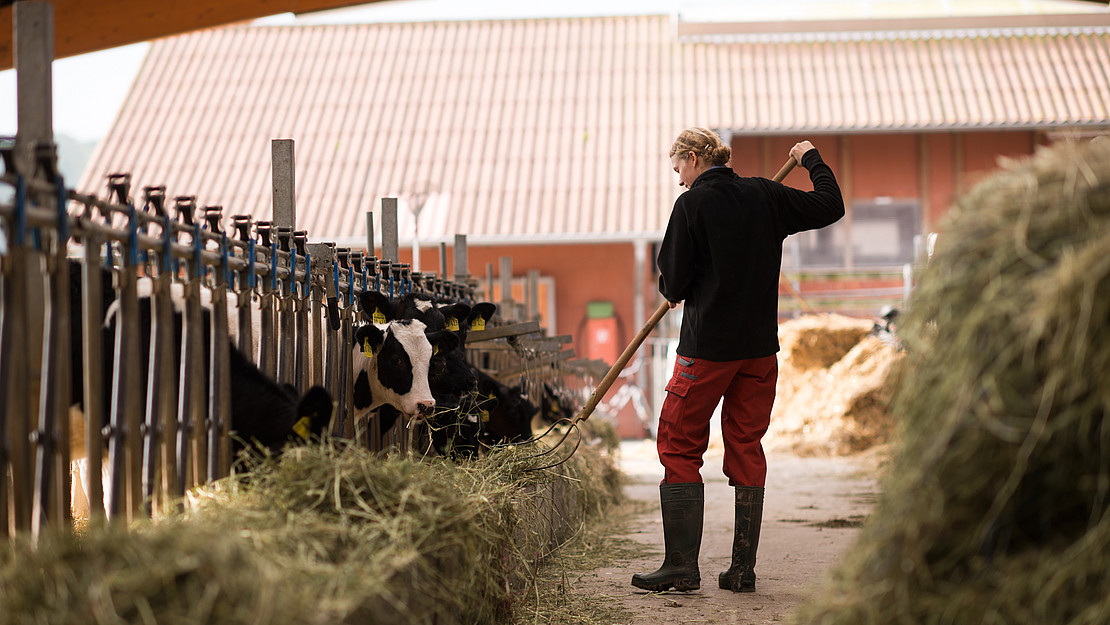This page contains automatically translated content.
Weltweit erster universitärer Studiengang für Ökologische Landwirtschaft startete vor 20 Jahren an der Uni Kassel
 Image: University of Kassel
Image: University of KasselUm den internationalen Stellenwert der Kasseler Agrarwissenschaften zu erkennen, reicht ein Blick ins Stadtbild von Witzenhausen. In dieser Kleinstadt rund 35 Kilometer östlich von Kassel hat der Fachbereich Ökologische Agrarwissenschaften seinen Sitz, eine Außenstelle der Universität Kassel. Von den rund 1000 Studierenden in Witzenhausen kommt jeder fünfte aus dem Ausland, in den englischsprachigen und international ausgerichteten Masterstudiengängen sind es mehr als die Hälfte. Internationale und deutsche Studierende bilden eine Gemeinschaft, die auch das kulturelle Leben in der Kleinstadt prägt.
In diesem Jahr gibt es ein Jubiläum zu feiern: Zum Herbst 1995 wurde der Studiengang Ökologische Landwirtschaft eingeführt; es war weltweit der erste Studiengang dieser Art an einer Universität. Mit seiner Ausrichtung auf ausschließlich ökologische Agrarwissenschaften und nachhaltiges Wirtschaften stellt der Fachbereich in Witzenhausen eine weltweite Besonderheit dar. Vom Ackerboden über die Tierzucht bis zur Vermarktung landwirtschaftlicher Produkte erforschen die Wissenschaftlerinnen und Wissenschaftler an 20 Fachgebieten Aspekte nachhaltiger und gerechter Ernährungs- und Energiekreisläufe. Entwicklungen made in Witzenhausen reichen von der Biotonne über Spielzeug für Mastschweine bis zu Methoden ökologischer Schädlingsbekämpfung. Auch beispielsweise die Entdeckung einer alter Bananenart in Arabien ist Witzenhäuser Forschergeist zu verdanken, denn einige Fachgebiete widmen sich der Landwirtschaft in den Tropen und Subtropen. Daher unterhält der Fachbereich für Lehr- und Forschungszwecke auch ein Tropengewächshaus mit über 400 Nutzpflanzen. Für Forschung und Lehre zu Ackerbau und Viehzucht unserer Breiten bewirtschaftet die Universität darüber hinaus die Hessische Staatsdomäne Frankenhausen als 340 ha großen Ökobetrieb, unweit von Kassel gelegen.
Für die Studierenden gehören praktische Übungen in Ställen oder auf dem Feld, im Gewächshaus oder im Labor dazu. Das Angebot an Studiengängen hat sich mit der Umstellung auf das Bachelor-/Master-System inzwischen aufgefächert und spezialisiert: Neben einem Bachelor und einem Master Ökologische Landwirtschaft umfasst es die englischsprachigen Master-Studiengänge Sustainable International Agriculture (in Kooperation mit der Universität Göttingen) sowie International Food Business and Consumer Studies (in Kooperation mit der Hochschule Fulda). Zum kommenden Herbst startet der Fachbereich mit dem ebenfalls englischsprachigen Studiengang Sustainable Food Systems eine Kooperation mit fünf weiteren europäischen Universitäten. Zusätzlich wird ein Duales Studium Landwirtschaft angeboten, in dem zur Vernetzung von Praxis und Theorie nebeneinander eine landwirtschaftliche Lehre und das Bachelorstudium absolviert werden.
Exzellente Karriere-Perspektiven
Die Beschäftigungsaussichten nach dem Abschluss sind sehr gut. „Die Einsicht, dass ein ökologischer Landbau ein Gewinn für Umwelt, Tier und Mensch sein kann, hat sich inzwischen in weiten Teilen der Welt durchgesetzt“, sagt der Dekan des Fachbereichs, Prof. Dr. Peter von Fragstein und Niemsdorff. „Mit unseren Studiengängen bieten wir eine wissenschaftlich exzellente Ausbildung für all jene, die die Entwicklung hin zu einer ökologischen Landwirtschaft mit prägen oder sie in ihrem weiteren Werdegang selbst leben wollen.“ Erhebungen der Universität Kassel haben ergeben, dass ein Jahr nach dem Abschluss neun von zehn Absolventen eine Beschäftigung gefunden haben. Nur rund drei Prozent sind anderthalb Jahre nach Abschluss erwerbslos (andere studieren beispielsweise weiter oder promovieren). Rund ein Drittel der beschäftigten Absolventinnen und Absolventen arbeitet in Land- und Forstwirtschaft, rund ein Viertel im Dienstleistungssektor. Viele gestalten in Verbänden (acht Prozent) oder in der öffentlichen Verwaltung (sechs Prozent) die Agrarpolitik mit. Zu den Absolventen gehört beispielsweise Peter Röhrig, Geschäftsführer des Bundes Ökologische Lebensmittelwirtschaft.
Die Einrichtung des Studiengangs Ökologische Landwirtschaft folgte 1995 einer Entwicklungslinie, die bis ins Kaiserreich zurückgeht: 1898 wurde in Witzenhausen die Deutsche Kolonialschule gegründet, die Siedler auf das landwirtschaftliche Leben in den Kolonien vorbereiten sollte und bis 1944 bestand. In den 60er Jahren richteten Bund und Land in Witzenhausen Ingenieurschulen für Ausländische und Inländische Landwirtschaft ein, die 1971 bei der Gründung der Gesamthochschule (heute Universität) Kassel Teil dieser neuen Institution wurden. 1993 vereinigten sich die beiden Fachbereiche Landwirtschaft und Internationale Agrarwissenschaft zum heutigen Fachbereich Ökologische Agrarwissenschaften. Zum Herbst 1995 schließlich wurde der Studiengang Ökologische Landwirtschaft eingeführt, damals als Diplomstudiengang; es war weltweit der erste universitäre Studiengang dieser Art. Dem war die Gründung des Fachgebietes Methoden des Alternativen Landbaus im Jahr 1981 vorausgegangen (heute Fachgebiet Ökologischer Land- und Pflanzenbau), was sich als wesentlicher Motor dieser Entwicklung herausstellte. Die Einschreibungen für den neuen Studiengang begannen im Sommer 1995. „Der ökologische Landbau hatte sich damals zwar in der Praxis schon etabliert“, erinnert sich Holger Mittelstraß, Studienkoordinator des Fachbereichs, „er füllte aber eher eine Nische aus, und eine wissenschaftliche Auseinandersetzung damit fand kaum statt. Entsprechend galten die ersten Absolventinnen und Absolventen noch als Exoten. Inzwischen hat sich gezeigt, wie weitsichtig die Entscheidung war.“
Weitere Informationen für Studieninteressierte:
http://www.uni-kassel.de/fb11agrar/studium-allgemein/informationen-fuer-studieninteressierte.html
Foto (Foto: Uni Kassel):
http://www.uni-kassel.de/uni/fileadmin/datas/uni/presse/anhaenge/2015/Umwelt_2014_0087.jpg
Bildunterschrift: Studium mit Kuh: Eine Studentin bei praktischen Arbeiten im Stall des Lehr- und Versuchsbetriebs Frankenhausen.
Kontakt:
Dekanat
Fachbereich Ökologische Agrarwissenschaften
Universität Kassel
Tel.: +49 5542 98-1211
Email: dekfb11@uni-kassel.de
Sebastian Mense
Universität Kassel
Kommunikation, Presse- und Öffentlichkeitsarbeit
Tel.: +49 561 804-1961
Email: presse@uni-kassel.de